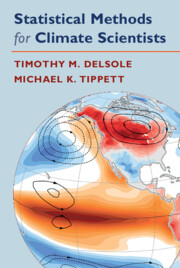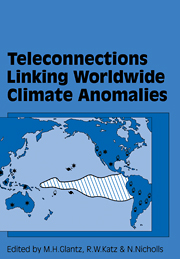Statistical Methods for Climate Scientists
A comprehensive introduction to the most commonly used statistical methods relevant in atmospheric, oceanic and climate sciences. Each method is described step-by-step using plain language, and illustrated with concrete examples, with relevant statistical and scientific concepts explained as needed. Particular attention is paid to nuances and pitfalls, with sufficient detail to enable the reader to write relevant code. Topics covered include hypothesis testing, time series analysis, linear regression, data assimilation, extreme value analysis, Principal Component Analysis, Canonical Correlation Analysis, Predictable Component Analysis, and Covariance Discriminant Analysis. The specific statistical challenges that arise in climate applications are also discussed, including model selection problems associated with Canonical Correlation Analysis, Predictable Component Analysis, and Covariance Discriminant Analysis. Requiring no previous background in statistics, this is a highly accessible textbook and reference for students and early-career researchers in the climate sciences.
- A short description of a statistical problem and illustrative example are provided at the start of each chapter, allowing the reader to decide if the technique in the chapter is relevant to a particular problem
- Specific statistical challenges that arise in climate applications are addressed, making it highly relevant for climate courses
- Each method is described clearly and thoroughly using plain language
Reviews & endorsements
‘This text will be useful for teaching advanced undergraduates and graduate students about the applications of statistical methods to climate data analysis. It is filled with many relevant examples informed by the authors' long experience in the field. I am sure that I will frequently use it as a reference in the coming years for my own research.’ Tom Hamill, National Oceanic and Atmospheric Administration
‘This book is essential for any climate scientist and is ideally suited for an introductory graduate course in climate analysis. The material covered includes a comprehensive sample of classical and modern multi-variate techniques that are widely used in the peer-reviewed literature. The step-by-step examples are clearly based on years of hands-on teaching experience by the authors and are easily implementable and, importantly, highlight interpretation and limitations - a must for any climate analysist.’ Ben Kirtman, University of Miami
‘An appealing book written by outstanding authors, with basic to advanced topics in every chapter, including some unusual topics for a statistics book such as data assimilation and the most predictable modes. The iteration with several years of students to produce an understandable and logical text (which is formal and analytical in nature) is unique and worthy for consideration as a textbook for graduate courses or as refresher for any geophysical scientist.’ Huug van den Dool, NOAA
‘Includes both the mathematics and the intuition needed for climate data analysis.’ Dennis L. Hartmann, University of Washington
'… this comprehensive presentation of statistical techniques will be helpful to many graduate students and researchers in climate science … Highly recommended.' S. G. Decker, Choice
‘… Timothy DelSole and Michael Tippett aim to streamline students’ mathematical training by collecting the most important methods into a single textbook … As more climate scientists venture into such subtle problems as whether to attribute extreme events like prolonged heat waves to climate change, the critical statistical thinking skills fostered in Statistical Methods for Climate Scientists will be of increasing importance.’ Brad Marston, Physics Today
Product details
May 2022Hardback
9781108472418
542 pages
250 × 173 × 28 mm
1.17kg
Available
Table of Contents
- 1. Basic Concepts in Probability and Statistics
- 2. Hypothesis Tests
- 3. Confidence Intervals
- 4. Statistical Tests Based on Ranks
- 5. Introduction to Stochastic Processes
- 6. The Power Spectrum
- 7. Introduction to Multivariate Methods
- 8. Linear Regression: Least Squares Estimation
- 9. Linear Regression: Inference
- 10. Model Selection
- 11. Screening: A Pitfall in Statistics
- 12. Principal Component Analysis
- 13. Field Significance
- 14. Multivariate Linear Regression
- 15. Canonical Correlation Analysis
- 16. Covariance Discriminant Analysis
- 17. Analysis of Variance and Predictability
- 18. Predictable Component Analysis
- 19. Extreme Value Theory
- 20. Data Assimilation
- 21. Ensemble Square Root Filters
- 22. Appendix
- References
- Index.





